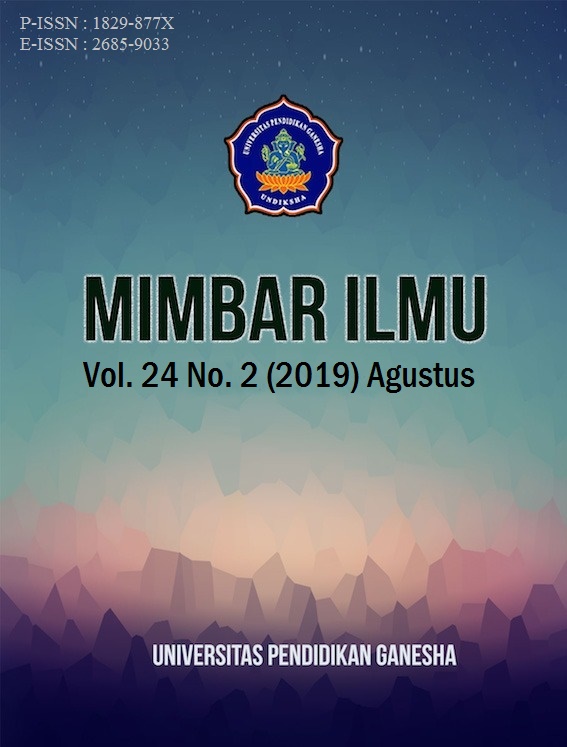PENGARUH METODE PROYEK TERHADAP KEMAMPUAN KERJASAMA ANAK KELOMPOK A
DOI:
https://doi.org/10.23887/mi.v24i2.21261Abstract
Penelitian ini bertujuan untuk mengetahui pengaruh yang signifikan metode proyek terhadap kemampuan kerjasama anak elompok A Taman Kanak-Kanak Gugus V Kecamatan Buleleng. Penelitian ini adalah penelitian eksperimen semu (quasi eksperiment). Desain penelitiannya adalah Non Equivalen Pretest-Posttest Control Group Design. Populasi dari penelitian ini adalah sebanyak 183 anak yang ada di gugus V kecamatan Buleleng, sedangkan sampel berjumlah 72 anak. Hasil dari penelitian ini yaitu rerata kemampuan kerjasama anak yang mengikuti metode proyek yaitu 38,41, sedangkan rerata kemampuan kerjasama anak yang dibelajarkan tanpa menggunakan metode proyek yaitu 30,46. Hasil analisis data lebih lanjut dipeoleh nilai thitung = 16,45 dan ttabel dengan dk (37+35-2 = 70) dengan taraf signifikansi 5% = 1,99 dengan demikian thitung>ttabel = 16,45> 1,99, maka H0 ditolak dan H1 diterima. Maka dapat disimpulkan bahwa metode proyek berpengaruh terhadap kemampuan kerjasama anak kelompok A di gugus V Kecamatan Buleleng Tahun Pelajaran 2018/2019. Berdasarkan simpulan tersebut, maka disarankan kepada peneliti lain agar dapat menggunakan metode pembelajaran yang dapat meningkatkan kemampuan kerjasama anak.
Kata kunci : Metode Proyek, Kemampuan Kerjasama, AUD
Abstract
This study was aimed at investigating the significant effect of project based learning towards students abilities in group A at Kindergarten Cluster Five, Buleleng district. This study used Quasi Experiment, and the design of this study was Non Equivalent Pretest-Posttest Control Group Design. The population of this study was 183 students of clustiver five, Buleleng district, meanwhile the sample was 72 students. The result of study was found the average of students abilities in group which is implemented project based learning method was 34.81. while the students abilities in group which did not implement project based learning method in the classroom was only 30.46. The further result of analyzing the data for t-count value was 16.45 and t-table with dk (37+35-70) and significant degree was 5% = 1,99 therefore t-count>t-table= 16.45>1.99. Hence, null hypothesis (H0) was rejected meanwhile alternative hypothesis (H1) was accepted. It can be concluded that project based learning method gave an effect towards students cooperation abilities Group A, Bulelenf district academic year 2018/2019. Based on the conclusion, so it suggested to antoher research to use appropriate teaching me5thod on increase studens cooperation ability.
Keywords: Project Based Learning Method, Cooperation Abiliity, Young Children
References
Agung, A. A. G. 2014. Buku Ajar Metodologi Penelitian Pendidikan. Malang. Media Publishing.
Ambara Didith Pramunditya, dkk. 2014. Asesmen Anak Usia Dini. Yogyakarta: Graha Ilmu.
Apriono, D. 2011. Meningkatkan Keterampilan Kerjasama Siswa Dalam Belajar Melalui Pembelajaran Kolaboratif. Jurnal Prospektus, IX (2).
Hamdayama, Jumanta. 2016. Metodologi Pengajaran. Jakarta: Bumi Aksara.
Jayadiningrat, Made Gautama, and Emirensia K. Ati. "Peningkatan Keterampilan Memecahkan Masalah Melalui Model Pembelajaran Problem Based Learning (PBL) pada Mata Pelajaran Kimia." Jurnal Pendidikan Kimia Indonesia 2.1 (2018): 1-7.
Moeslichatoen R. 2004. Metode Pengajaran di Taman Kanak-kanak. Jakarta: Rineka Cipta.
Pratiwi, Ika Ari, dkk. 2018. “Peningkatan Kemampuan Kerjasama Melalui Model Project Based Learning (PjBL) Berbantu Metode Edutainment Pada Mata Pelajaran Ilmu Pengetahuan Sosial”. Journal Refleksi Edukatika. Volume 8, Nomor 2. P-ISSN:2087-9385 E-ISSN:2528-696X.
Prayuanti, Endah. 2014. “Peningkatan Kerjasama Melalui Metode Bermain Pada Kelompok A di TK PKK 54 Pucung Pendowoharjo Sewon Bantul”. Tugas Akhir. (Tidak diterbitkan). Jurusan Pendidikan Prasekolah dan Sekolah Dasar. Universitas Negeri Yogyaarta.
Sugiyono. 2016. Metode Penelitian Pendidikan (Pendekatan Kuantitatif, Kualitatif dan R&D). Bandung: Alfabet.
Yus, Anita, M.Pd. Dr. 2011. Penilaian Perkembangan Belajar Taman Kanak Kanak. Jakarta: Kencana Prenada.
Downloads
Published
How to Cite
Issue
Section
License
Copyright (c) 2019 Mutiara Magta, Putu Rahayu Ujianti, Elina Dewi Permatasari

This work is licensed under a Creative Commons Attribution-ShareAlike 4.0 International License.
This work is licensed under a Creative Commons Attribution-ShareAlike 4.0 International License.
Authors who publish with this journal agree to the following terms:
- Authors retain copyright and grant the journal right of first publication with the work simultaneously licensed under a Creative Commons Attribution-ShareAlike 4.0 International License that allows others to share the work with an acknowledgment of the work's authorship and initial publication in this journal.
- Authors are able to enter into separate, additional contractual arrangements for the non-exclusive distribution of the journal's published version of the work (e.g., post it to an institutional repository or publish it in a book), with an acknowledgment of its initial publication in this journal.
- Authors are permitted and encouraged to post their work online (e.g., in institutional repositories or on their website) prior to and during the submission process, as it can lead to productive exchanges, as well as earlier and greater citation of published work.





